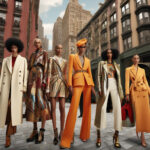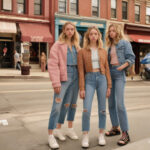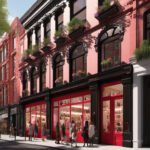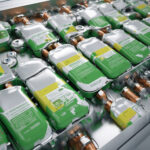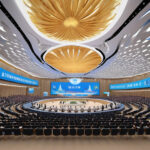The beauty landscape is witnessing a significant shift as brands associated with the minimalist “clean-girl” aesthetic make their mark on the Middle East market, particularly in Dubai. Beauty brands such as Saie, Kosas, Ilia, and Glossier are taking bold steps by launching in Sephora Middle East this fall, targeting a region traditionally known for a more glamorous, high-coverage makeup style.
Since its launch in 2019, Saie has built a solid reputation as a go-to brand for influencers specializing in the “no-makeup makeup” look. This shift to Dubai for its first international brick-and-mortar store signals a strategic move in the evolving beauty landscape. Saie’s entry into Sephora Middle East on October 6 is a prominent example of how U.S. beauty brands plan to carve out a niche in a market that has historically favored full-glam aesthetics.
Notably, the GCC countries, which include Bahrain, Kuwait, Oman, Qatar, Saudi Arabia, and the United Arab Emirates, have emerged as high-priority zones for global brand expansion. According to Euromonitor International, the beauty market in this region is valued at approximately $46 billion and is projected to rise to $60 billion by 2025—a growth trajectory that has attracted the attention of many beauty brands.
In a region where heavier makeup has long been the norm, a growing affinity for naturally derived ingredients and a more understated makeup look presents an opportunity for “clean-girl” brands to flourish. For instance, Kosas made its debut in Sephora Middle East in September, while Glossier followed suit in October. Ilia Beauty, which attempts a comeback after an initial launch setback in 2015, is also set to reintegrate into the market this month with curated window displays.
Saie’s founder and CEO, Laney Crowell, noted the unexpected demand for their products, saying, “Our look is not what you would necessarily think is of interest in the Middle East, and yet, we’ve broken through.” On their launch day, Saie soared to the top of Sephora Middle East’s online sales, which demonstrates the increasing receptiveness of consumers toward brands that prioritize skin-friendly ingredients and a minimalist aesthetic.
Dubai is not only home to influential beauty figures such as Huda Kattan of Huda Beauty, but it has also become a global epicenter for beauty trends, making it the perfect initial stop for brands entering the GCC market. The city’s shopping culture, characterized by sprawling malls and a vibrant consumer environment, sets the stage for beauty brands to effectively engage with their audiences.
Sephora’s flagship Dubai Mall location stands as the top-grossing store in the retailer’s global portfolio, which further accentuates the importance of this market for beauty brands. The upcoming Sephoria beauty convention in Dubai in November, organized by Sephora, will also provide new brands with a substantial platform to gain visibility among enthusiastic local consumers.
As the trend towards effortless, “no-makeup makeup” continues to gain traction, influencers and beauty enthusiasts in the Middle East are catalyzing this paradigm shift. For brands like Kosas, emphasizing a full-glam look that still appears natural aligns with regional preferences. Sheena Zadeh, founder of Kosas, shared that while their marketing reflects comfort and an effortless aesthetic, it still caters to the region’s appreciation for completeness and elaboration in beauty routines.
A notable observation is that the clean beauty narrative is gradually taking root in the region, with consumers increasingly emphasizing ingredient transparency and seeking products that promote skin health. As Firras Alwahabi of Faux Consultancy points out, the appetite for clean formulations is on the rise, with both influencers and consumers advocating for a return to simpler, less damaging makeup routines.
This increasing demand has led brands to rethink their offerings and strategies. Ilia Beauty’s founder, Sasha Plavsic, recalled the brand’s earlier attempts to penetrate the market and emphasized that consumer preferences have shifted significantly since then. In the past, heavier coverage makeup was popular, but now, there’s a growing interest in lighter, more natural formulations.
As TikTok continues to influence beauty trends worldwide, the GCC market is not an exception. Brands previously established in the region, like Nudestix, experienced substantial sales boosts largely due to social media visibility, particularly following notable celebrity endorsements.
While these brands gain momentum, they face the challenge of converting local consumers to a more nuanced makeup approach. As Zadeh insightfully noted, “I don’t think the Middle Eastern consumer, myself included, will ever be totally no-makeup makeup. We’re very proud of our beauty routine and it’s very complete.”
The future of beauty in the Middle East appears promising with brands merging the best of both worlds: minimalist aesthetics and the enduring allure of glam. This fusion not only sets the stage for innovative marketing strategies but also invites deeper conversations surrounding beauty standards, ingredient integrity, and consumer choice.
With the beauty scene in the Middle East continuously evolving, brands willing to adapt will undoubtedly find fertile ground for growth and resonance among consumers.
